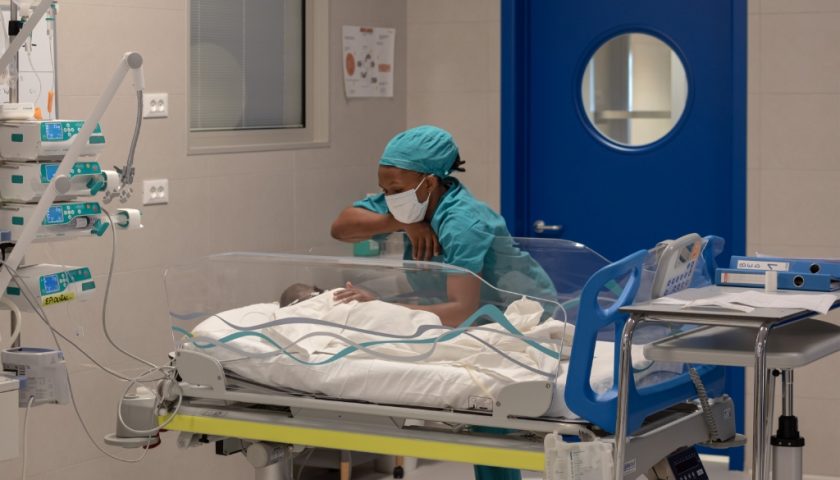
‘’On the night of April 29th, I developed very high temperature coupled with rapid stomach pain, I first mistook it for normal sickness until the situation ran out of my control. I could barely walk. I felt like I was carrying a big stone in my stomach,’’ Margaret Nakanwagi 29, a resident of Buloba says.
Nakanwagi who vividly remembers the dark moment says she was rushed to hospital immediately after the abrupt attack and the doctors there after a round of checkups discovered that her stomach could not hold the baby any longer.
‘’One doctor told me that my pressure was too high and that I could easily have died together with my baby if I was not operated. You can imagine, I was just seven months and a few weeks pregnant and since it was my first time, I was left in shock because I had never witnessed such an incident,’’ she says.
‘’Natural birth was the last thing I could barely think of because I was in pain, the doctors admitted me to the C- section where I delivered from. My son was weighing about 11b 4oz.4kg and that same evening they told me they had placed him an incubator where they had to monitor his daily progress.’’
With strong hope to see her baby grow to maturity, Nakanwangi’s hopes were short lived. On the morning of the fourth day, she was awakened by news that her daughter had suddenly died from the incubator. The doctors told her she had died of breathing complications.
Her case is, however, not spared, many similar scandals related to preterm births continue to occur. According to the internet definition, preterm births occur more than three weeks before the baby’s due date.
According to a 2018 report from the World Health Organization, every single year at least an estimated 15 million babies are born before 37 completed weeks of gestation with the number even still rising. The report also indicates that complications arising from these births are the leading cause of death among children under five years of age, amounting to approximately one million deaths in 2015.
But what causes these preterm births
Preterm births occur for various reasons, as Dr. Herbert Kayiga, a senior gynecologist at Mulago hospital, says. According to Dr. Kayiga, most of these births occur naturally, although some can happen as a result of early induction of labor.
Kayiga says several unknown and known factors can increase a woman’s chances of going into early labor including health-related complications and early pregnancies. He says pregnant mothers have a high chance of delivering early if they are younger than 17 or older than 35.
‘’There is no immediate cause for the births. Some are natural and by this I mean God’s plan but of course there are also some that happen during caesarean birth. This is an operation in which a woman’s uterus is cut open to allow a baby to be born whether for medical or non-medical reasons.’’ Kayiga says.
‘’Other causes can be related to health infections and complications such as diabetes, heart disease, kidney disease, high blood pressure, urinary tract and amniotic membrane infections in addition to other pregnancy related factors including poor nutrition before and during pregnancy, smoking and constant use of illegal drugs.”
Kayiga in addition, says women who have in the past experienced multiple preterm births are susceptible to experiencing the same. He further cites that the births can also happen due to uterus failures which can easily weaken the cervix causing it to open before its due date.
Complications associated with the births
Although not all premature babies experience complications, being born too early can cause short-term and long-term health problems. The earlier a baby is born, the more likely they are to experience complicated medical challenges as Dr. Kayiga says.
Kayiga explains that a premature baby may immediately after their birth develop abnormal signs including low body weight and size in addition to other life threatening conditions. He discloses that for some, the complications may begin to show immediately at birth, while others may not see them up to a later stage.
Going further, he says the most common preterm births fall under the late preterm stage which usually happens when a baby is born between 34 and 36 completed weeks of pregnancy. Kayiga says during this period the baby might develop breathing difficulties in addition to other complications including very low body temperature.
‘’Premature babies, especially those born very early, often have complicated medical problems so the earlier your baby is born, the higher the risk of complications because there are sections for example late preterm for those born between 34 and 36 completed weeks of pregnancy, moderate preterm for those born between 32 and 34 weeks of pregnancy,’’ Kayiga explains.
‘’Then we have very preterm, born at less than 32 weeks of pregnancy, extreme preterm for babies born at or before 25 weeks of pregnancy but most premature births occur in the late preterm stage and here babies mostly likely develop very mild symptoms but of course with serious complications including breathing distress, fine hair covering much of the body and Low body temperature, because the baby has low stored body fat.’’
Long term complications
According to Dr. Henry Acidri, a senior house officer at the department of Obstretics and Gynecology at Mulago hospital, in the long term, the births may lead to persistent disabilities in addition to other complicated disorders.
Acidri says preterm babies can easily be exposed to infections due to their low immunity. He says the preterm syndrome can also have a huge effect on one’s brain, lungs, and other body organs, including the intestines. He adds that statistics have showed that most premature infants are easily exposed to early deaths.
‘’These babies can at times even develop long term effects because of this preterm syndrome, some can lose proper eye sight, others can also develop mental problems and by this I mean the brain damaging. Also evidence has showed others more so for the extreme preterm, the baby’s lungs and intestines can be impaired.’’
‘’This early birth can also have a huge impact on the child’s teeth for example where you find a child between three to five years but the teeth are still very few in the mouth and also they are not aligned properly, others are also very weak because they need.
Solution
In situations where one delivers a preterm baby, Dr. Ceaser Komakech, a senior gynecologist says depending on how much care the new born requires, it needs to be admitted to an intensive care unit from where its growth will be properly monitored.
Komakech says since most preterm births happen spontaneously, it is literally very hard to establish how to easily avoid them. He however, cites that there are certain behaviors that can be undertaken by expectant mothers to deter them from early births.
Women more so those with a past history of a preterm birth, a short cervix or both factors according to Komakech can be in position to reduce the preterm birth risk with the application of progesterone supplementation. Progesterone Supplements are prescriptions given to women with infertility problems.
‘’These progesterone supplements help the woman’s uterus to grow during pregnancy and also prevents it from any early contractions so the supplements help prepare the body to welcome the pregnancy and thicken the uterine lining in addition to supporting the embryo to remain properly attached to the womb until the birth date,’’ Komakech says.
‘’This helps to reduce on any risk of preterm births but also without forgetting the nutritional habits because if an expectant woman does not feed properly chances are high that they can be exposed to this preterm syndrome so we urge them to feed well on a balanced diet accordingly,’’ he adds.
